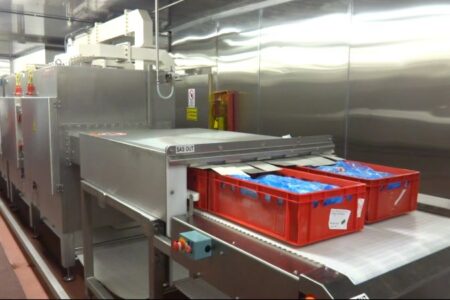Can the UK grow its own cultivated meat market?

Image: Emily Lythell, Mewburn Ellis
On Wednesday 21 June 2023, the United States Department of Agriculture (USDA) approved the sale of cell-cultivated chicken, for the first time, by UPSIDE Foods and GOOD Meat.
A landmark moment for the future of food, this represents a crucial step forward in the journey to find alternative, environmentally-friendly, and ethically-sound methods of meat production. The approvals will surely spark renewed interest and significant additional investment in cellular agriculture technology, driving yet further innovation in this fast-moving field.
This makes the US the second jurisdiction to approve cultivated meat for sale, after Singapore in late 2020. We hope that the UK’s Food Standards Agency (FSA) will also move soon, as we expect early adopters of the technology to enjoy significant economic benefit from the commercial opportunities opened-up by approvals.
Part of the mix
Lab-grown meat was identified in the 2021 “National Food Strategy” as being a new industry the UK had both the motivation and means to support. At the time, the white paper commented that “the Government has been slow to offer support and investment to companies developing novel proteins. As a result, most of this work is currently happening elsewhere”, most notably in Singapore. However, a recent uptick in Governmental support includes a £12M investment in the form of a new Cellular Agriculture Manufacturing Hub at the University of Bath, announced in April this year. There has also been a big increase in private investment in this area in the UK (rising from £12m in 2021 to £59m in 2022).
Despite this increase in investment in the sector, the existing regulatory framework risks hindering its development in the UK. Before cultivated meat products can be sold in the UK, they must first be approved by the FSA as “novel foods”. The FSA’s Novel Foods Guidance explains that it can take up to 17 months to break through the red tape, and it can take even longer if the FSA requests further information to validate product safety. By contrast, the regulatory process takes just 9-12 months in Singapore.
In January 2023, Oxford-based cultivated meat company Ivy Farm Technologies announced its plans to locate its first manufacturing plant in a country primed for regulatory approval rather than the UK, adding “[t]he transition to sustainable proteins is a globally pressing issue, and we believe by focusing on a launch market with a more favourable regulatory environment, such as the USA and Singapore, we’ll be able to make the biggest difference in the most efficient way.” There will surely be more companies to follow if the UK does not match the rate of progress.
Clear guidance
Earlier in June, Deloitte published recommendations for changes to the UK’s Novel Foods Regulatory Framework in a report commissioned by the FSA, observing that “a good regulatory process does not impose unnecessary barriers to innovation”. The report highlights a number of considerations, including the small size of businesses working in this field; smaller R&D start-ups may need additional support from the FSA through the regulatory process in order to nurture this nascent industry. The report places particular emphasis on clear guidance and expectations, as well as a call for greater transparency; the sharing of non-confidential application information, as well as publication of risk assessment outcomes, would improve outcomes. A suggestion in the report to streamline authorisation processes for key industries would be particularly beneficial for cellular agriculture technology. Prioritisation of applications in this field would align with national strategies such as Net Zero, and could prove to be mutually beneficial for Government and industry alike.
The FSA would do well to provide the means to accelerate the process for obtaining regulatory approval for cultivated meat products to avoid losing out on both R&D and manufacturing activity in the UK. Post-Brexit, the UK has the opportunity to design a new, expedited regulatory process ahead of the EU and cement its position at the forefront of what is forecast by many to be a global economic boon. Major stakeholders have suggested adopting a six to nine month assessment period, which would put the UK well ahead of the EU’s currently lengthy procedure for approval across all 27 member states.
Meeting of minds
One final important point highlighted in the Deloitte report is the opportunity the FSA now has to “more formally collaborate with other regulators, academia and other organisations”. The review notes that while the current risk assessment process is thorough, “opportunities for synergy through grouping applications for similar products and/or drawing on evidence and conclusions in other jurisdictions are not always fully maximised.” Stakeholders would be encouraged to see the development of bilateral agreements in relation to food innovation, similar to the Mutual Recognition Agreements (sharing information on drug safety) between the FDA and the MHRA.
Cultivated meat is poised to revolutionise the global food system, and the UK should look to act quickly if they want to enjoy a slice of the action.



